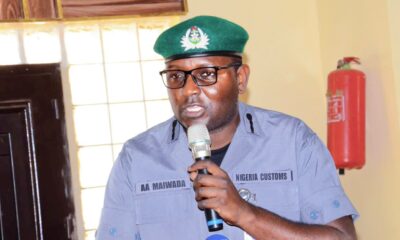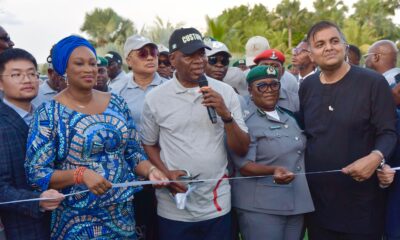Customs Report
How Onyeka Is Remodeling Tin Can Island Customs Port

When Comptroller Frank Onyeka of the Nigeria Customs Service (NCS) assumed control of the Tin Can Island Customs Port Command in December 2024, few could have predicted the scale of transformation he would unleash.
Once plagued by inefficiencies, congestion, and reputational setbacks, Nigeria’s second-largest seaport is now emerging as a model of reform, innovation, and strategic excellence, reports Eguono Odjegba.
Revenue Renaissance
Under Onyeka’s stewardship, Tin Can Island Port has shattered revenue records. In the first quarter of 2025 alone, the command generated ₦347.9 billion – a 12.6% increase compared to the same period in 2024. Monthly collections surged, with ₦116.4 billion in January, ₦103.2 billion in February, and ₦128.2 billion in March; and in that order. The most dramatic milestone came on August 19, 2025, when the command raked in an unprecedented ₦16.4 billion in a single day.
Observers and insiders say this financial leap wasn’t accidental but was engineered through the deployment of the Unified Customs Management System (UCMS), otherwise known as B’Odogwu. This digital platform streamlined operations, eliminated bottlenecks, and enabled real-time cargo clearance and payment processing.
Tech-Driven Transformation
The B’Odogwu system is more than just a software, somehow it has since become a symbol of Onyeka’s vision for a transparent, accountable, and efficient customs environment. By integrating valuation, monitoring, and enforcement into a single digital interface, the system has reduced dwell times and improved predictability for stakeholders.
Shipping lines and cargo owners now praise the port’s operational rhythm, where cargo flows seamlessly and delays are minimized. The digital shift has also enhanced compliance and reduced the risk of revenue leakages.
Strategic Engagement & Stakeholder Synergy
Onyeka’s leadership style is collaborative. His open-door policy and stakeholder engagement have fostered trust and alignment across terminal operators, shipping companies, Customs agents, and regulatory bodies.
This synergy has been vital in balancing trade facilitation with national revenue goals. During the 2025 International Customs Day, Onyeka highlighted the command’s alignment with the World Customs Organization’s mandate -emphasizing modernization, security, and economic growth.
Training, Morale & Culture Shift
Beyond systems and numbers, Onyeka has invested in people. He has championed staff training, instilled a culture of excellence, and motivated personnel to take ownership of their roles. His mantra “Excellence is our standard” echoes through the port, inspiring innovation and pride. And the result is as well predictable!
It has produced a workforce that is not just compliant but committed. Also, enforcement has become smarter, monitoring more precise, and recovery efforts more strategic.
Positioning Nigeria for Continental Trade

With the African Continental Free Trade Agreement (AfCFTA) opening new trade corridors, Onyeka sees Tin Can Island as a gateway to regional commerce. Instructively, his reforms are positioning Nigeria as a competitive maritime hub, capable of attracting investment and facilitating cross-border trade.
It must be stated emphatically that this apparent remodeling of the port was not without its challenges, some of which is listed here below:
- Multiple Alert Syndrome
Before Onyeka’s intervention, the port was plagued by multiple alert issues – a situation where cargo was flagged repeatedly by different units, causing delays and frustration for stakeholders. This not only slowed down clearance but also eroded trust in the system. Onyeka addressed this by streamlining alert protocols and engaging stakeholders to harmonize inspection procedures.
- Compromised Container Examination
One of the most persistent challenges was compromised container inspections. Prior to Onyeka’s reforms, some officers allegedly colluded with agents to undervalue goods or overlook contraband, leading to revenue losses and security risks. Onyeka responded by assigning only officers with proven integrity to examination duties and enforcing strict accountability measures.
- Economic Sabotage & Smuggling
Smuggling and economic sabotage were significant threats to revenue and national security. Onyeka’s aggressive enforcement strategy – including seizures of arms, drugs, and undervalued goods has helped reduce these activities to bare minimum, even though the threat remains a constant challenge.
- Resistance to Reform
As with any major transformation, Onyeka faced internal resistance from entrenched interests uncomfortable with transparency and digitalization. His success in deploying the B’Odogwu system and enforcing compliance reflects his ability to overcome institutional inertia through discipline and strategic leadership.
Despite these challenges, Onyeka’s tenure is widely seen as a turning point for Tin Can Island Port. His proactive, reform-driven approach has not only addressed long-standing issues but also laid the groundwork for sustainable growth and global competitiveness.
Presidential Recognition
Between December 2024 and July 2025, Tin Can Island Port’s alignment with national priorities – revenue generation, trade facilitation and security, earned it the comptroller general’s vote of confidence. This endorsement underscores the impact of Onyeka’s leadership on both the port and Nigeria’s broader economic landscape.
Legacy in Motion
For the impartial, Onyeka’s tenure at Tin Can Island Port is more than a success story, it’s a blueprint for institutional transformation. By blending technology, strategy, and human capital, he’s not just remodeling a port; he’s redefining what Nigerian maritime excellence looks like.
If this were a ship, it’s safe to say Onyeka is steering it full speed ahead.


































